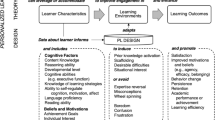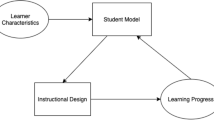Abstract
New developments in technology-enhanced and mobile learning advocate for learning personalization, adaptation and student collaboration. Many existing learning systems and a vast body of research work focus on a single aspect or advantage of technology that enhances learning experience, creating systems tailored for a specific use with limited extensibility, adaptivity and collaboration possibilities. There is dearth of more complete solution that would allow for utilization of the full potential of state-of-the-art technologies for implementing new pedagogies and ways of learning without the need for complete existing solution redesign. In this paper we propose a system with the overarching idea that existing digital learning lessons can be systematically transformed so that they utilize contemporary learning pedagogies of adaptation and collaborative learning. By exploring the technology affordances throughout three case studies, an architectural approach to modularizing and extending existing lessons using adaptive or collaborative pedagogies is demonstrated and advocated for.

















Similar content being viewed by others
References
Alvarez, C., Alarcon, R., & Nussbaum, M. (2011). Implementing collaborative learning activities in the classroom supported by one-to-one mobile computing: A design-based process. Journal of Systems and Software, 84(11), 1961–1976. https://doi.org/10.1016/j.jss.2011.07.011.
Bower, M., Dalgarno, B., Kennedy, G. E., Lee, M. J. W., & Kenney, J. (2015). Design and implementation factors in blended synchronous learning environments: Outcomes from a cross-case analysis. Computers & Education, 86, 1–17. https://doi.org/10.1016/j.compedu.2015.03.006.
Brusilovsky, P., & Peylo, C. (2007). Adaptive and intelligent web-based educational systems. International Journal of Artificial Intelligence in Education (IJAIED), 13, 159–172.
Chiang, T. H. C., Yang, S. J. H., & Hwang, G. (2014). An augmented reality-based mobile learning system to improve students’ learning achievements and motivations in natural science inquiry activities. Educational Technology & Society, 17, 352–365. https://doi.org/10.1109/ISMAR.2006.297800.
El Guabassi, I., Bousalem, Z., Al Achhab, M., JELLOULI, I., & Mohajir, B. E. (2018). Personalized adaptive content system for context-aware ubiquitous learning. Procedia Computer Science, 127(8), 444–453. https://doi.org/10.1016/j.procs.2018.01.142.
Fita, A., Monserrat, J. F., Moltó, G., Mestre, E. M., & Rodriguez-Burruezo, A. (2016). Use of synchronous e-learning at university degrees. Computer Applications in Engineering Education, 24(6), 982–993. https://doi.org/10.1002/cae.21773.
Garcia-Cabot, A., De-Marcos, L., & Garcia-Lopez, E. (2015). An empirical study on m-learning adaptation: Learning performance and learning contexts. Computers & Education, 82, 450–459. https://doi.org/10.1016/j.compedu.2014.12.007.
Holenko Dlab, M., Boticki, I., Hoic-Bozic, N., & Looi, C. (2017). Adaptivity in synchronous mobile collaborative learning. In L. Gómez Chova, I. López Martínez, & A. Candel Torres (Eds.), Proceedings of the International Conference on Education and New Learning Technologies - EDULEARN17 (pp. 454–460). Barcelona: IATED Academy.
Holenko Dlab, M., Hoic-Bozic, N., & Boticki, I. (2017b). A design-based approach to developing a mobile learning system. World Academy of Science, Engineering and Technology, International Journal of Social, Behavioral, Educational, Economic, Business and Industrial Engineering, 11(10), 2320–2325.
Hsiao, I. H., Sosnovsky, S., & Brusilovsky, P. (2010). Guiding students to the right questions: Adaptive navigation support in an E-Learning system for Java programming. Journal of Computer Assisted Learning, 26(4), 270–283. https://doi.org/10.1111/j.1365-2729.2010.00365.x.
Jagušt, T., Botički, I., & So, H.-J. (2018). Examining competitive, collaborative and adaptive gamification in young learners' math learning. Computers & Education, 125, 444–457. https://doi.org/10.1016/j.compedu.2018.06.022.
Jagušt, T., Mekterović, I., & Botički, I. (2015). The experiences of setting up, developing and implementing a mobile learning project in Croatia: The SCOLLAm project. In 2015 IEEE Frontiers in Education Conference (FIE). IEEE. https://doi.org/10.1109/FIE.2015.7344160.
Järvelä, S., Kirschner, P. A., Panadero, E., Malmberg, J., Phielix, C., Jaspers, J., et al. (2014). Enhancing socially shared regulation in collaborative learning groups: Designing for CSCL regulation tools. Educational Technology Research and Development, 63(1), 125–142. https://doi.org/10.1007/s11423-014-9358-1.
Kirschner, P. A. (2017). Stop propagating the learning styles myth. Computers & Education, 106, 166–171. https://doi.org/10.1016/j.compedu.2016.12.006.
Looi, C., Lim, K. F., Pang, J., Lay, A., Koh, H., Seow, P., et al. (2016). Bridging formal and informal learning with the use of mobile technology. In C. S. Chai, C. P. Lim, & C. M. Tan (Eds.), Future learning in primary schools (pp. 79–96). New York: Springer.
Luo, L., Yang, Y., & Wei, Y. (2017). Research on adaptive mobile collaborative learning system. ACM Computing Surveys, 50(3), 413–423.
Madhubala, R., & Akila, A. (2017). Context aware and adaptive mobile learning: A survey. Advances in Computational Sciences and Technology, 10(5), 1355–1370.
Marcos-García, J. A., Martínez-Monés, A., & Dimitriadis, Y. (2015). DESPRO: A method based on roles to provide collaboration analysis support adapted to the participants in CSCL situations. Computers & Education, 82, 335–353. https://doi.org/10.1016/j.compedu.2014.10.027.
Martin, S., Diaz, G., Plaza, I., Ruiz, E., Castro, M., & Peire, J. (2011). State of the art of frameworks and middleware for facilitating mobile and ubiquitous learning development. Journal of Systems and Software, 84(11), 1883–1891. https://doi.org/10.1016/j.jss.2011.06.042.
Mutahi, J., Bent, O., Kinai, A., Weldemariam, K., & Sengupta, B. (2015). Capturing learner’s activity events from a mobile learning system using adaptive event framework. In Proceedings - 2nd ACM International Conference on Mobile Software Engineering and Systems, MOBILESoft 2015, (pp. 109–112). https://doi.org/10.1109/mobilesoft.2015.23.
O’Malley, C., Vavoula, G., Glew, J. P., Taylor, J., Sharples, M., Lefrere, P., & Waycott, J. (2005). Guidelines for learning/teaching/tutoring in a mobile environment. Public Deliverable from the MOBILearn Project (D.4.1).
Perveen, A. (2016). Synchronous and Asynchronous E-Language Learning: A Case Study of Virtual University of Pakistan. Open Praxis, 8(1), 21–39. https://doi.org/10.5944/openpraxis.8.1.212.
Rahul Raj, C. P., & Tolety, S. B. (2012). A study on approaches to build cross-platform mobile applications and criteria to select appropriate approach. 2012 Annual IEEE India Conference, INDICON 2012, 625–629. https://doi.org/10.1109/indcon.2012.6420693.
Sharples, M., Adams, A., Alozie, N., Ferguson, R., Fitzgerald, E., Gaved, M., & Yarnall, L. (2015). Innovating Pedagogy makers.
Shute, V. J., & Zapata-Rivera, D. (2012). Adaptive educational systems. Adaptive Technologies for Training and Education, 7(27), 7–27.
Soflano, M., Connolly, T. M., & Hainey, T. (2015). An application of adaptive games-based learning based on learning style to teach SQL. Computers & Education, 86, 192–211. https://doi.org/10.1016/j.compedu.2015.03.015.
Stahl, G., Koschmann, T., & Suthers, D. (2006). Computer-supported collaborative learning: An historical perspective. In R. K. Sawyer (Ed.), Cambridge handbook of the learning sciences (pp. 409–426). Cambridge: Cambridge University Press.
Strijbos, J.-W., & Weinberger, A. (2010). Emerging and scripted roles in computer-supported collaborative learning. Computers in Human Behavior, 26(4), 491–494. https://doi.org/10.1016/J.CHB.2009.08.006.
Su, C. H., & Cheng, C. H. (2015). A mobile gamification learning system for improving the learning motivation and achievements. Journal of Computer Assisted Learning, 31(3), 268–286. https://doi.org/10.1111/jcal.12088.
Sun, D., Looi, C.-K., & Xie, W. (2014). Collaborative Inquiry with a web-based science learning environment: When teachers enact it differently. Educational Technology & Society, 17(4), 390–403.
Syvänen, A., Beale, R., Sharples, M., Ahonen, M., & Lonsdale, P. (2005). Supporting pervasive learning environments: Adaptability and context awareness in mobile learning. In Proceedings - IEEE International Workshop on Wireless and Mobile Technologies in Education, WMTE 2005, 2005, (pp. 251–253). https://doi.org/10.1109/wmte.2005.62
Veerman, A. L., & Veldhuis-Diermanse, A. E. (2001). Collaborative learning through computer-mediated communication in academic education. In Proceedings European Perspectives on Computer Supported Collaborative Learning : Euro-CSCL (pp. 625–632). Maastricht : Maastricht McLuhan Institute.
Wald, M., Li, Y., & Draffan, E. A. (2014). Synote: collaborative mobile learning for all. Procedia Computer Science, 27, 240–250. https://doi.org/10.1016/j.procs.2014.02.027.
Wen, C., & Zhang, J. (2015). Design of a microlecture mobile learning system based on smartphone and web platforms. IEEE Transactions on Education, 58(3), 203–207. https://doi.org/10.1109/TE.2014.2363627.
Wong, L. H., & Looi, C. K. (2011). What seams do we remove in mobile-assisted seamless learning? A critical review of the literature. Computers & Education, 57(4), 2364–2381. https://doi.org/10.1016/j.compedu.2011.06.007.
Xanthopoulos, S., & Xinogalos, S. (2013). A comparative analysis of cross-platform development approaches for mobile applications. In Proceedings of the 6th Balkan Conference in Informatics on - BCI’13, (p. 213). https://doi.org/10.1145/2490257.2490292.
Zhao, X., Anma, F., Ninomiya, T., & Okamoto, T. (2008). Personalized adaptive content system for context-aware mobile learning. IJCSNS International Journal of Computer Science and Network Security, 8, 153–161.
Zhao, X., & Okamoto, T. (2008). A device-independent system architecture for adaptive mobile learning. Eighth IEEE International Conference on Advanced Learning Technologies, 2008, 23–25. https://doi.org/10.1109/ICALT.2008.21.
Zurita, G., & Nussbaum, M. (2007). A conceptual framework based on activity theory for mobile CSCL. British Journal of Educational Technology, 38(2), 211–235. https://doi.org/10.1111/j.1467-8535.2006.00580.x.
Author information
Authors and Affiliations
Corresponding author
Additional information
Publisher's Note
Springer Nature remains neutral with regard to jurisdictional claims in published maps and institutional affiliations.
Rights and permissions
About this article
Cite this article
Jagušt, T., Botički, I. Mobile learning system for enabling collaborative and adaptive pedagogies with modular digital learning contents. J. Comput. Educ. 6, 335–362 (2019). https://doi.org/10.1007/s40692-019-00139-3
Received:
Revised:
Accepted:
Published:
Issue Date:
DOI: https://doi.org/10.1007/s40692-019-00139-3




